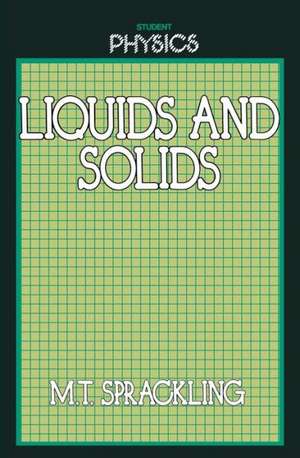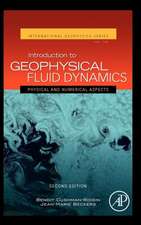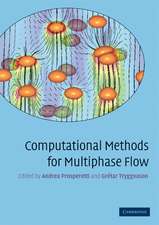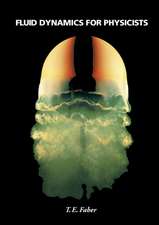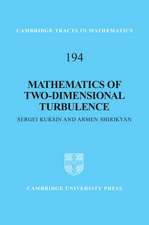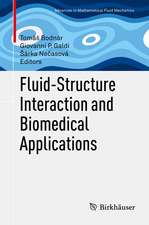Liquids and Solids: Student Physics Series
Autor Michael Spracklingen Limba Engleză Paperback – 4 iul 1985
Preț: 381.81 lei
Nou
Puncte Express: 573
Preț estimativ în valută:
73.07€ • 76.00$ • 60.32£
73.07€ • 76.00$ • 60.32£
Carte tipărită la comandă
Livrare economică 15-29 aprilie
Preluare comenzi: 021 569.72.76
Specificații
ISBN-13: 9780710204844
ISBN-10: 0710204841
Pagini: 256
Ilustrații: X, 244 p. 10 illus.
Dimensiuni: 127 x 203 x 13 mm
Greutate: 0.27 kg
Editura: SPRINGER NETHERLANDS
Colecția Springer
Seria Student Physics Series
Locul publicării:Dordrecht, Netherlands
ISBN-10: 0710204841
Pagini: 256
Ilustrații: X, 244 p. 10 illus.
Dimensiuni: 127 x 203 x 13 mm
Greutate: 0.27 kg
Editura: SPRINGER NETHERLANDS
Colecția Springer
Seria Student Physics Series
Locul publicării:Dordrecht, Netherlands
Public țintă
ResearchCuprins
1 Condensed phases.- 1.1 Introduction.- 1.2 The three phases of matter.- 1.3 Intermolecular forces.- 1.4 Solids.- 1.5 Liquids.- 2 The elastic properties of matter.- 2.1 Forces and equilibrium in a finite body.- 2.2 Elasticity.- 2.3 Stress.- 2.4 Strain.- 2.5 Infinitesimal strain.- 2.6 The relationship between stress and strain.- 2.7 Moduli of elasticity.- 2.8 The theorem of superposition.- 2.9 The linear, isotropic, elastic solid.- 2.10 Elastic moduli and intermolecular forces.- 2.11 Strain energy.- 2.12 The torsion of a right circular cylinder.- 2.13 Elastic limit and yield stress.- 2.14 The elasticity of liquids.- 3 The deformation and fracture of simple crystals.- 3.1 Introduction.- 3.2 Plastic deformation.- 3.3 Plastic deformation by slip.- 3.4 The theoretical critical resolved shear stress.- 3.5 Dislocations.- 3.6 The critical resolved shear stress and work hardening.- 3.7 Brittle fracture.- 3.8 The theoretical brittle strength.- 3.9 Ductile fracture.- 3.10 The plastic deformationof brittle solids.- 4 The liquid phase.- 4.1 Introduction.- 4.2 The tensile strength of liquids.- 4.3 Liquid flow.- 4.4 Coefficient of viscosity.- 4.5 Critical velocity.- 4.6 Fluidity and solidity.- 4.7 Models of simple liquids.- 4.8 Melting.- 4.9 Liquid helium.- 4.10 The two-fluid model of HeII.- 5 Ideal liquids.- 5.1 Introduction.- 5.2 Some large-scale properties of liquids.- 5.3 Real and ideal liquids.- 5.4 The acceleration of a liquid particle.- 5.5 Euler’s equations of motion.- 5.6 The equation of continuity.- 5.7 Solutions of Euler’s equations.- 5.8 Applications of the Bernoulli equation.- 5.9 Irrotational flow.- 5.10 The stream function.- 5.11 Circulation and vorticity.- 5.12 The Navier-Stokes equation.- 6 The slow viscous flow of liquids.- 6.1 Introduction.- 6.2 Creeping viscous flow in a semi-infinite channel.- 6.3 Poiseuille flow in tubes of circular cross-section.- 6.4 Motion of a Newtonian liquid between two coaxial cylinders.- 6.5 Bodies in liquids.- 6.6 Liquid flow and intermolecular forces.- 6.7 Non-Newtonian liquids.- 6.8 Viscometers.- 7 Surface effects.- 7.1 Introduction.- 7.2 Excess surface free energy and surface tension of liquids.- 7.3 The total surface energy of liquids.- 7.4 Surface tension and intermolecular forces.- 7.5 Solid surfaces.- 7.6 Specific surface free energy and the intermolecular potential.- 7.7 Liquid surfaces and the Laplace-Young equation.- 7.8 liquid spreading.- 7.9 Young’s relation.- 7.10 Capillary effects.- 7.11 The sessile drop.- 7.12 Vapour pressure and liquid-surface curvature.- 7.13 The measurement of surface free energies.- 8 High polymers and liquid crystals.- 8.1 Introduction.- 8.2 High polymers.- 8.3 The mechanisms of polymerisation.- 8.4 The size and shape of polymer molecules.- 8.5 The structure of solid polymers.- 8.6 The glass transition temperature.- 8.7 Young’s modulus of solid polymers.- 8.8 Stress-strain curves of polymers.- 8.9 Viscous flow in polymers.- 8.10 liquid crystals.- Appendix 1 Exercises.- Appendix 2 Answers to exercises.
